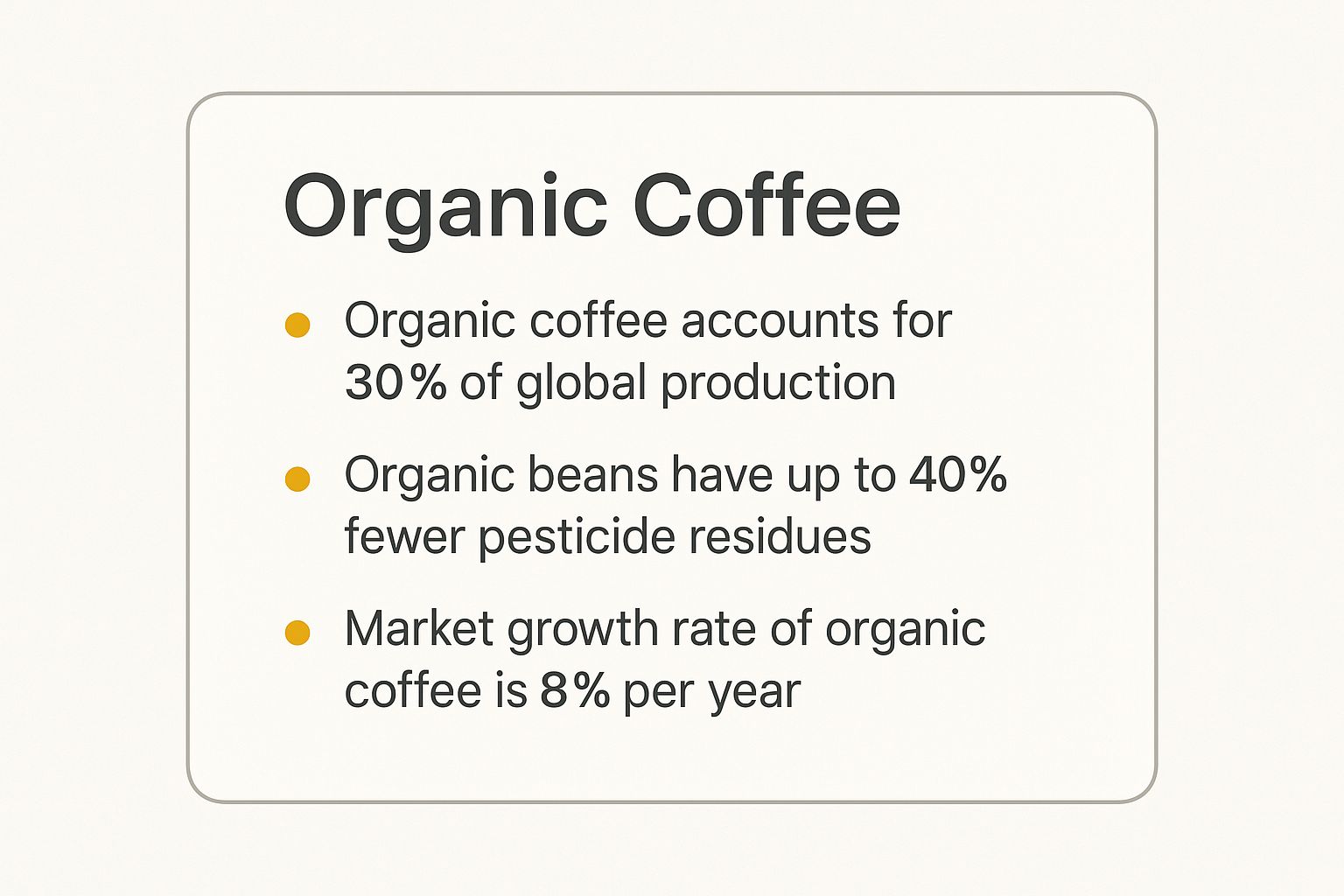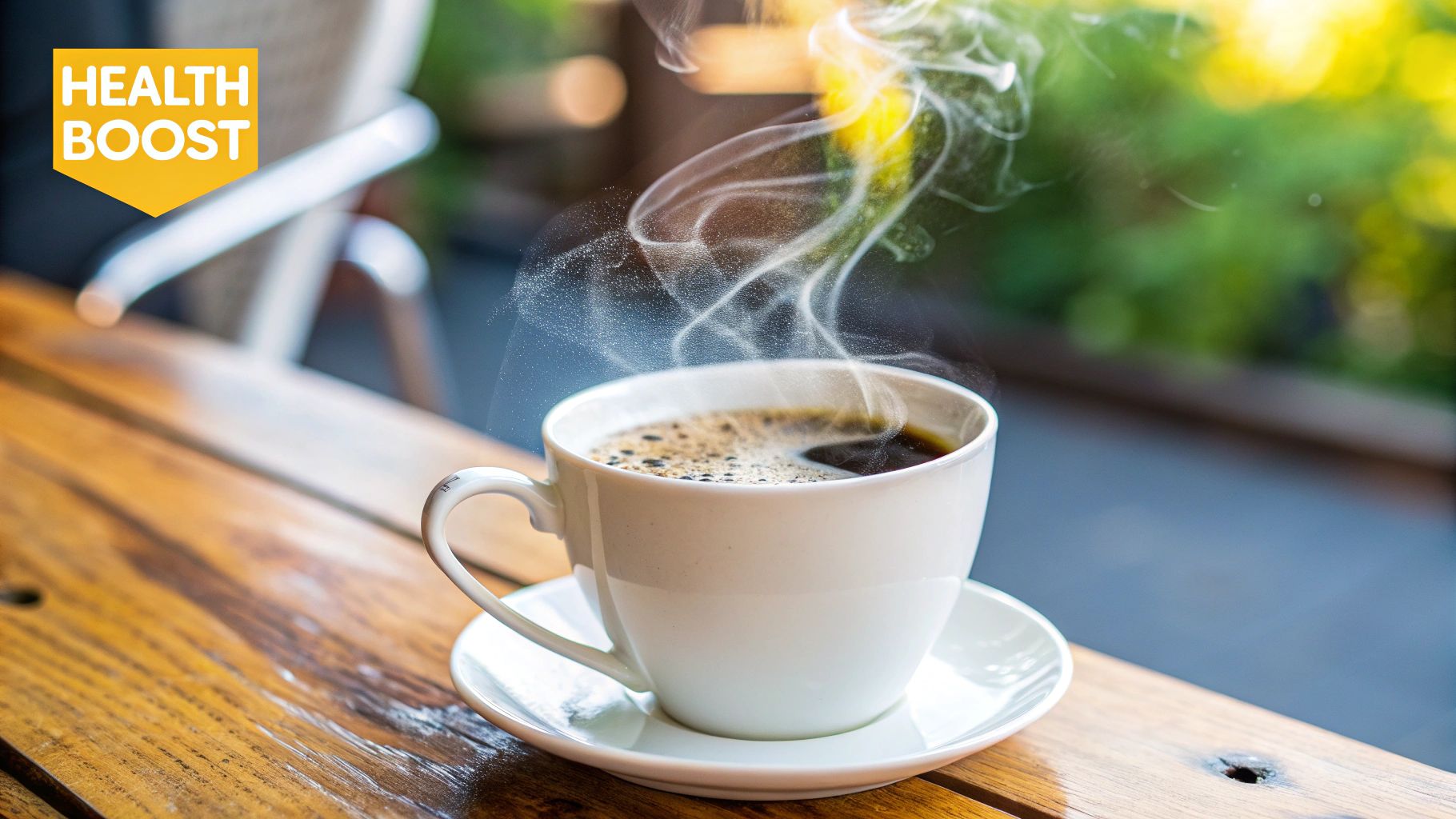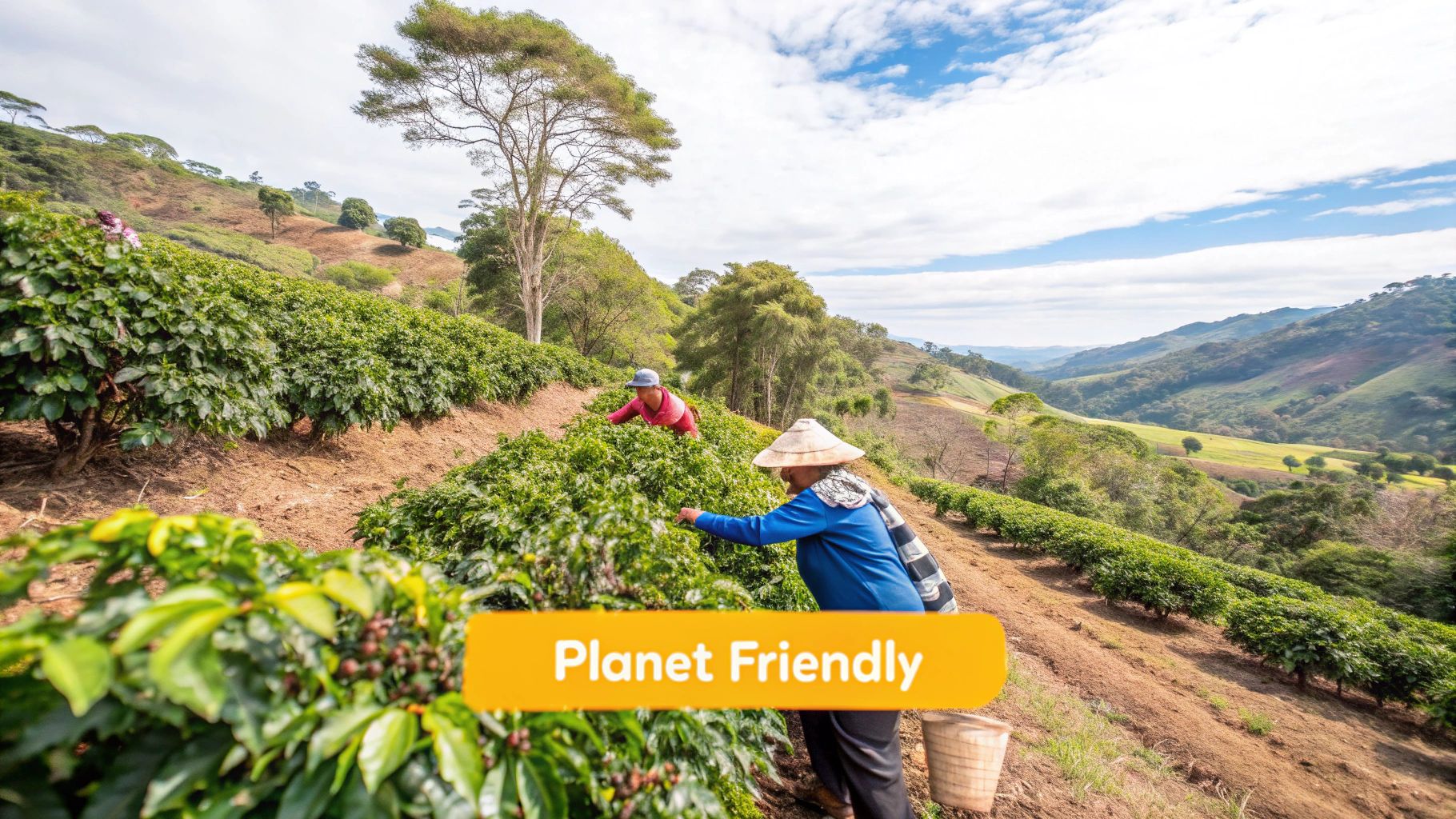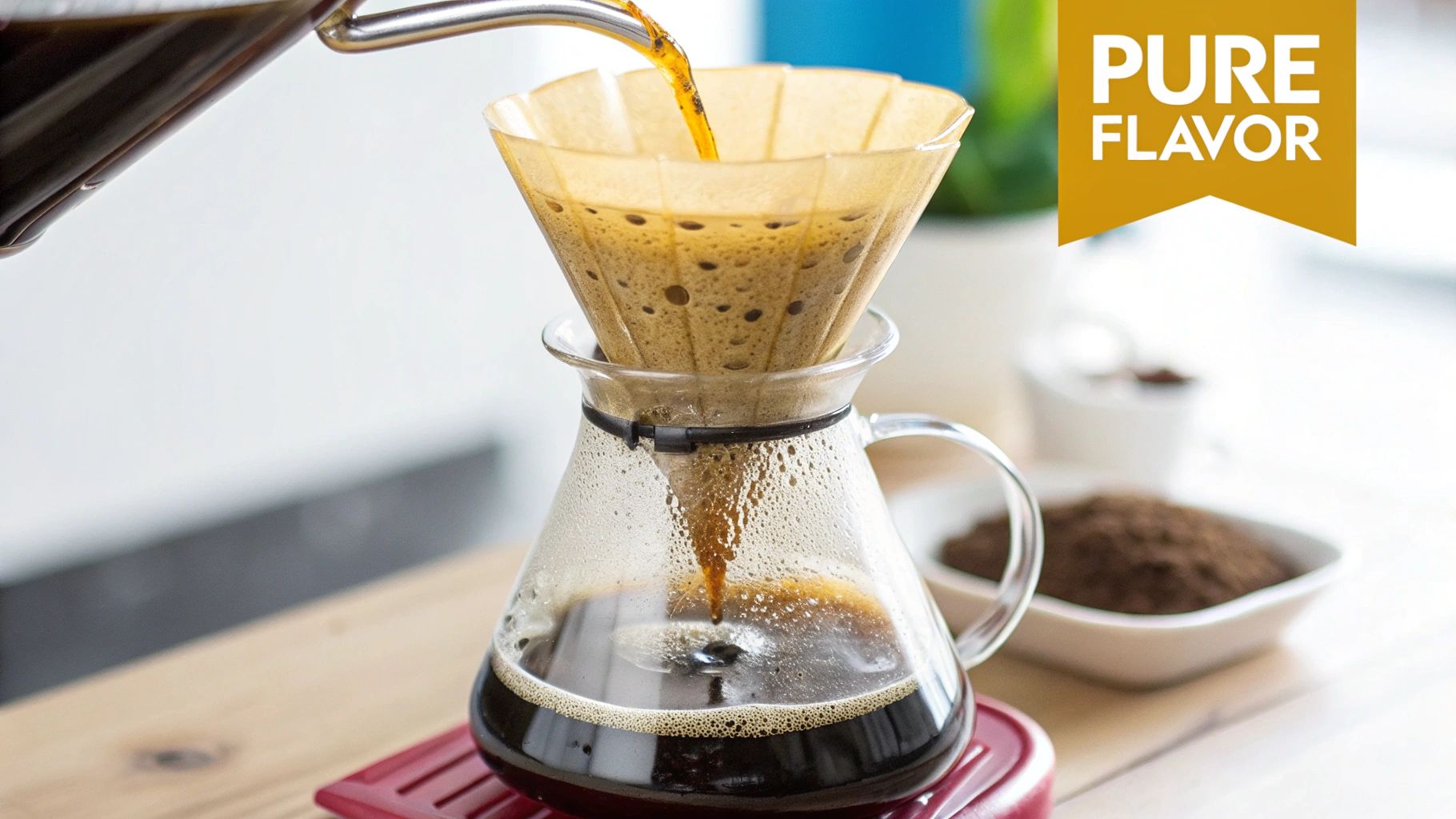Switching to organic coffee might seem like a small change, but it packs a powerful punch for your health, the planet, and even your palate. It’s a simple way to ensure your daily brew is free from synthetic pesticides and chemicals, often richer in beneficial antioxidants, and grown in a way that supports a healthier earth.
What Does Organic Coffee Really Mean for Your Morning Cup?
Most of us love our coffee routine, but we rarely stop to think about how those beans were actually grown. Here’s a startling fact: conventional coffee is one of the most chemically-treated crops on the planet. That means your morning mug could contain lingering residues from synthetic pesticides, herbicides, and fertilizers.
This is where the benefits of organic coffee come into play. When you see that organic seal on a bag of beans, it’s not just marketing fluff. It’s a guarantee that you're getting a cleaner, more mindfully produced product from farm to cup.
The Three Pillars of Organic Coffee Benefits
The real value of organic coffee boils down to three core advantages:
- Better for Your Body: By steering clear of synthetic chemical residues, you lower your exposure to substances that don't belong in your body. Plus, organic farming often results in beans with a richer profile of healthy nutrients.
- Healthier for the Planet: Organic farms are designed to work with nature, not against it. They focus on creating rich, healthy soil, conserving precious water, and fostering biodiversity, making them far more sustainable than their conventional counterparts.
- A Superior Taste Experience: It's simple, really: healthier soil produces a better crop. As a result, organic coffee beans frequently deliver more complex, vibrant, and authentic flavors, letting the true character of the coffee shine through.
This isn't just a niche trend; it's a movement backed by some compelling numbers.

These stats tell a clear story. Organic coffee is becoming a major force in the global coffee scene, driven by people who want to know what's in their cup.
The market reflects this growing demand. Valued at roughly USD 8.66 billion, the global organic coffee market is on track to nearly double by 2032. This incredible growth is fueled by a rising awareness of its benefits for both people and the planet. You can discover more insights about the organic coffee market growth and what's driving it.
Choosing organic is an investment in a system that prioritizes purity and sustainability all the way through. When you see a label like the "USDA Organic" seal, you can trust it. It's a regulated certification confirming the coffee was grown and processed under strict, chemical-free guidelines—a clear promise of quality you can count on.
To make it even clearer, let's break down the key differences between organic and conventional coffee side-by-side.
Organic vs Conventional Coffee A Quick Comparison
This table offers a snapshot of how the two approaches stack up across the board.
| Benefit Area | Organic Coffee | Conventional Coffee |
|---|---|---|
| Health | Grown without synthetic pesticides, herbicides, or fertilizers, leading to a cleaner cup. Often higher in antioxidants. | Commonly grown with a wide array of synthetic chemicals, residues of which may end up in the final product. |
| Environment | Promotes biodiversity, conserves water, and builds healthy soil. A sustainable, eco-friendly approach. | Can lead to soil erosion, water contamination, and deforestation. Relies on chemical inputs. |
| Quality & Taste | Beans mature slowly in nutrient-rich soil, often resulting in more complex, nuanced, and authentic flavors. | Flavor can be less complex due to a focus on high-yield, chemically-supported farming methods. |
Ultimately, the choice between organic and conventional coffee comes down to what you value most in your daily ritual.
A Healthier Choice for Your Daily Routine
When you grab a bag of organic coffee, you're doing more than just picking out your morning brew. You're making a conscious decision for your long-term health. The biggest, most immediate benefit of organic coffee is what’s not in it: synthetic pesticides, herbicides, and fertilizers. It’s a sobering fact that conventional coffee is one of the most chemically-treated crops on the planet, and those residues don’t always wash off before the beans make it to your kitchen.
Think of your body like a high-performance engine. You wouldn't knowingly fill it with contaminated, low-grade fuel day after day. Over time, those chemical residues from conventional farming can build up, putting an extra load on your body’s natural detox systems. By going organic, you simply remove that source of exposure. You're giving your body cleaner fuel to run on.
This one simple switch has some pretty big implications. Lowering your daily chemical load is consistently linked to better health. By sidestepping all those synthetic inputs, organic coffee helps support your body’s metabolic and cardiovascular functions, which can lead to a healthier heart and more balanced energy throughout your day.

Unlocking a Higher Antioxidant Content
Beyond just avoiding the bad stuff, choosing organic often means you’re getting more of the good stuff. Organic coffee beans frequently have a higher concentration of beneficial antioxidants, which are basically your body’s personal security detail. These powerful compounds protect your cells from the damage caused by unstable molecules called free radicals.
So, what does that actually mean for you? A diet packed with antioxidants helps to:
- Fight Inflammation: Chronic inflammation is at the root of many health problems. The antioxidants in coffee help calm that internal fire.
- Support Your Immune System: By taking out the cellular trash, antioxidants free up your immune system to do its job properly.
- Promote Cellular Health: They shield your cells from the daily grind of oxidative stress, contributing to your overall wellness in the long run.
"The absence of synthetic pesticides and herbicides in organic coffee not only provides a cleaner cup but also allows the coffee plant to produce a richer profile of natural protective compounds, including antioxidants."
It all starts in the soil. The healthier, nutrient-rich earth used in organic farming lets the coffee plant flourish and build up its own natural defenses. This creates a bean that’s not just cleaner, but often nutritionally richer. Some research even suggests this combination—less chemical exposure and more antioxidants—may play a role in lowering the risk of certain chronic diseases, like cardiovascular issues and Type 2 diabetes. If you're curious about the data, you can explore detailed insights on the organic coffee market to learn more.
A Proactive Step for Daily Wellness
At the end of the day, switching to organic coffee is a simple, proactive step toward a healthier life. This isn't about giving something up; it's about upgrading a daily ritual you already love into one that actively supports your body.
Every cup becomes a small, intentional choice to nourish yourself with something purer and more nutrient-dense. By starting your morning with organic coffee, you're investing in your well-being, one delicious sip at a time. It’s one of the easiest—and most enjoyable—upgrades you can make to your daily routine.
How Organic Coffee Protects the Planet
When you choose organic coffee, you’re doing more than just picking a healthier brew for yourself—you’re casting a powerful vote for a healthier planet. Your daily cup can directly support farming methods that work with nature, not against it, turning what could be a simple crop field into a vibrant, thriving ecosystem.
Think about a typical conventional coffee farm for a moment. To maximize yield, it often relies on a heavy arsenal of synthetic fertilizers and pesticides. Over time, this approach can strip the soil of its natural nutrients, leading to erosion and an even greater dependency on chemical inputs. It’s a system that takes from the earth without really giving anything back.

Building Healthy Soil From the Ground Up
Organic coffee farming flips that script entirely. The whole philosophy starts with building rich, resilient soil, because that’s the foundation for everything else.
Instead of quick chemical fixes, farmers use natural techniques that not only grow fantastic coffee but also regenerate the land itself. These practices create a living, breathing foundation for the coffee plants.
- Composting: Forget synthetic fertilizers. Organic farmers enrich the soil with natural compost, often made from the coffee cherry pulp and other organic matter, returning vital nutrients right back to the earth.
- Cover Crops: By planting other beneficial plants around the coffee trees, farmers can prevent soil erosion, help the ground retain moisture, and naturally keep weeds in check.
- Water Conservation: Healthy, organic soil acts like a giant sponge. It holds onto water far more effectively, which reduces the need for excessive irrigation and helps conserve this precious resource.
This deep commitment to soil health means every bag of organic coffee you buy supports a farm that is actively improving its local environment.
An organic coffee farm isn't just growing beans; it's cultivating life. By rejecting chemical shortcuts, these farms become sanctuaries for wildlife, protectors of water, and builders of fertile earth for generations to come.
A Haven for Biodiversity and Clean Water
One of the most incredible environmental impacts of organic coffee is the way it protects biodiversity. When you take synthetic pesticides out of the equation, the entire ecosystem begins to heal. Birds return to the trees, beneficial insects like bees and ladybugs thrive, and a natural balance is slowly restored.
Many organic coffee farms are shade-grown, which means the coffee plants grow under a protective canopy of diverse, native trees. This practice creates a complex habitat that supports a stunning variety of wildlife. These farms essentially become vital corridors for migratory birds and other animals, preserving a level of biodiversity that conventional monoculture farms just can't match.
On top of that, this sustainable approach safeguards local water sources. Without chemical pesticides and fertilizers, there’s no toxic runoff to contaminate streams, rivers, and groundwater. This not only protects the drinking water for local communities but also preserves the delicate aquatic life in those waterways. When you start thinking about these ethical dimensions, it’s also worth exploring what Fair Trade coffee is and how it complements organic practices by ensuring farmers are treated justly.
Choosing organic is a small act with a big ripple effect. It supports a global movement toward a more sustainable and balanced world—one delicious cup at a time.
Experience a Purer, More Authentic Flavor
Setting aside the impressive health and environmental perks for a moment, let's talk about one of the most immediate rewards of switching to organic coffee: it simply tastes better. Your daily cup transforms from a simple caffeine fix into a genuine flavor experience, free from the chemical static that can muddy the taste of conventionally grown beans.
Think of a coffee bean as a tiny sponge, soaking up every nuance of its environment. When that environment is a thriving, nutrient-rich soil, untouched by synthetic chemicals, the bean itself develops a far more complex and interesting character. The whole philosophy behind organic farming is building up that healthy soil, and that's the real secret to a superior-tasting coffee.

How Healthy Soil Unlocks Better Taste
When you remove synthetic pesticides and fertilizers from the equation, the coffee plant gets to grow the way nature intended. Instead of being force-fed a cocktail of chemicals to grow faster, it matures at a natural pace, pulling a wide spectrum of authentic nutrients directly from the earth. This slower, more deliberate process is the key to unlocking exceptional flavor.
The true taste of a coffee bean is a direct reflection of the soil it was grown in. By eliminating chemical residues, organic farming allows the bean's authentic tasting notes—whether they're fruity, floral, or chocolatey—to emerge with stunning clarity.
This clean cultivation means there's no lingering chemical aftertaste to mask or distort the coffee's delicate notes. Every sip is a pure expression of its origin. Understanding what single origin coffee is can take this appreciation even further, connecting these unique tastes directly to the geography of the farm.
The Altitude and Shade Advantage
Many of the best organic coffees share another secret weapon for flavor: they are shade-grown at high altitudes. By cultivating coffee plants under the protective canopy of a diverse forest, farmers mimic the coffee plant's natural habitat. This has a profound effect on the bean.
The shade slows down the entire ripening process. This extra time on the branch allows the coffee cherry to develop a higher concentration of natural sugars and the complex acids that make a cup of coffee truly spectacular. The result is a physically harder, denser bean that is packed with concentrated flavor.
So, how does this all come together in your cup?
- Slower Maturation: The bean has more time to develop intricate sugars and acids, the building blocks of flavor.
- Higher Density: Denser beans literally hold more of the compounds that create a rich and nuanced taste.
- Nutrient-Rich Soil: The plant draws from a wider array of minerals, which translate into a more complex flavor profile.
Ultimately, choosing organic coffee isn't a compromise you make for your health or the planet. It's an upgrade for your taste buds, offering a cleaner, richer, and more memorable coffee experience every single morning.
How to Choose and Brew Your Perfect Organic Coffee
Alright, so you're ready to dive into the world of organic coffee. That's fantastic. Making the switch should be exciting, not intimidating, and I promise the journey from picking the right beans to sipping that perfect first cup is easier than you think. Let's walk through how to find great beans and brew them in a way that truly does them justice.
The first hurdle is often the coffee aisle itself. All those bags and labels can feel like a lot to take in, but once you know what to look for, a few key certifications will tell you everything you need to know about what's inside.
Decoding the Labels
Think of these certifications as a promise from the roaster to you. They're a guarantee that the coffee meets strict standards for quality, sustainability, and ethics, so you can feel good about what you're buying.
- USDA Organic: This is your go-to seal in the U.S. It’s a straightforward confirmation that the coffee was grown and processed without any synthetic pesticides, herbicides, or fertilizers. If you see this, you know you're getting a genuinely organic product.
- Fair Trade Certified: This one is all about people. It ensures that the farmers who dedicated their time and skill to growing your coffee were paid a fair, living wage and work in safe conditions. It’s a direct way to support their families and communities.
- Bird-Friendly: Issued by the Smithsonian Migratory Bird Center, this is one of the toughest environmental certifications out there. It means the coffee is not only organic but also shade-grown, which preserves the natural forest canopy that's a critical habitat for migratory birds and other wildlife.
When you choose coffee with these seals, you’re doing more than just buying a bag of beans. You’re casting a vote for a system that cares about personal health, environmental responsibility, and the well-being of farmers. It's a powerful choice.
Finding Your Ideal Organic Beans
So, where do you find these top-notch beans? The good news is, great organic coffee is easier to find than ever. You can often discover excellent options at your local grocery store, a specialty coffee shop in your town, or from countless online roasters. If you're not sure where to begin, checking out a curated list of the best organic coffee brands is a great way to discover some of the finest roasters out there.
Here’s a pro tip, no matter where you shop: always buy whole beans if you can. The moment coffee is ground, it starts losing its incredible aroma and flavor. Grinding your beans right before you brew is probably the single most important thing you can do to get the freshest, most delicious cup possible.
Simple Brewing Tips for a Better Cup
You’ve got your beautiful organic beans—now for the fun part. You don’t need a high-tech setup to make amazing coffee. The real secret is respecting the quality of the bean with a few fundamental techniques.
- Use the Right Grind: Your grind size should match your brewer. A coarse grind works best for a French press, a medium grind is perfect for most drip coffee makers, and you'll want a fine grind for methods like pour-over or espresso.
- Mind Your Water: Think about it—your brewed coffee is over 98% water, so its quality makes a huge difference. Always use filtered water to avoid any weird aftertastes from chlorine or minerals. For temperature, aim for water between 195-205°F (90-96°C), which is just below a full rolling boil.
- Find Your Method: Hands-on brewing methods like a French press or a simple pour-over are fantastic for bringing out the best in organic coffee. They give you more control, allowing you to really highlight the complex, subtle flavors locked inside the beans.
Follow these simple steps, and you'll ensure that every cup you make is a pure, delicious reward for the care that went into growing it.
Answering Your Questions About Organic Coffee
Even with all the benefits laid out, it's completely normal to have a few lingering questions before switching up your daily coffee ritual. Making a change often brings up practical points about cost, flavor, and just knowing you're getting the real deal. Let's tackle some of the most common questions head-on so you can feel great about your choice.
A lot of people look at the price and wonder, "Is it really worth the extra dollar or two?" That's a fair point, and the answer lies in what that higher price tag actually buys you. It’s less of a simple expense and more of an investment in a much healthier system, from the farm all the way to your cup.
That price difference covers the rigorous process of getting officially certified, avoiding cheap chemical fertilizers and pesticides, and embracing more hands-on farming methods that protect the land. In short, it’s the cost of doing things the right way.
Is Organic Coffee Really Worth the Higher Price?
In a word, yes. When you choose organic, you're not just buying coffee; you're casting a vote for a product that's cleaner for your body, fairer to the farmers, and kinder to our planet.
You're supporting agricultural practices that build rich, living soil and preserve precious water sources. For most people, the peace of mind and the long-term health benefits—both for themselves and the environment—are well worth the small daily premium. It’s an investment in quality you can taste and feel good about with every sip.
The price of organic coffee is a direct reflection of its value. It's a commitment to chemical-free farming, sustainable practices, and a higher standard of quality that conventional coffee simply doesn't meet.
Does Organic Coffee Taste Different Than Regular Coffee?
It absolutely can, and many people are surprised by just how noticeable the difference is. Coffee lovers and casual drinkers often describe organic coffee as having a cleaner, smoother, and more vibrant flavor. The secret is in the soil.
Organic coffee beans grow in nutrient-dense earth, free from chemical interference. This allows the bean's natural, complex flavors to develop to their full potential. Those subtle notes of fruit, chocolate, or nuts that make a great coffee so special can really shine. On the other hand, conventionally grown coffee can sometimes taste a bit flat or muted as a result of the chemicals used in its production.
How Can I Be Sure My Coffee Is Truly Organic?
This is a great question. The most straightforward way to know for sure is to look for an official certification seal right on the bag. These logos aren't just marketing fluff; they are legally regulated guarantees.
- The USDA Organic Seal: In the United States, this is the one to look for. It’s your confirmation that the coffee was grown and processed according to strict federal rules that forbid synthetic pesticides, herbicides, and fertilizers.
- Other Reputable Certifications: You might also see international seals like the EU's organic logo (a leaf made of stars). These also represent high standards and are recognized around the world.
Another good sign is buying from transparent brands that are proud to tell you where their coffee comes from and show off their certifications. It’s a clear signal that they stand by their commitment to providing a genuinely organic product.
Ready to experience a cleaner, more flavorful cup of coffee? At Cartograph Coffee, we're dedicated to providing high-quality, organic instant coffee that fits your busy life without compromise. Discover the difference for yourself by exploring our collection.